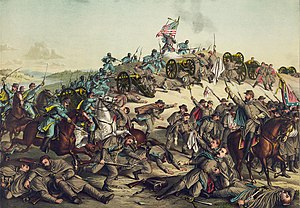Battle of Nashville
| Battle of Nashville | |||||||
|---|---|---|---|---|---|---|---|
| Part of the American Civil War | |||||||
 Battle of Nashville, Chromolithograph by Kurz & Allison, 1888. |
|||||||
|
|||||||
| Belligerents | |||||||
|
|
|
||||||
| Commanders and leaders | |||||||
| George H. Thomas | John Bell Hood | ||||||
| Units involved | |||||||
|
Army of the Cumberland (Dept. of the Cumberland):
|
Army of Tennessee | ||||||
| Strength | |||||||
| 55,000 | 30,000 | ||||||
| Casualties and losses | |||||||
|
3,061 (387 killed 2,558 wounded 112 missing/captured) |
∼ 6,000 (1,500 killed/wounded 4,500 missing/captured) |
||||||
Union victory
Army of the Cumberland (Dept. of the Cumberland):
The Battle of Nashville was a two-day battle in the Franklin-Nashville Campaign that represented the end of large-scale fighting west of the coastal states in the American Civil War. It was fought at Nashville, Tennessee, on December 15–16, 1864, between the Confederate Army of Tennessee under Lieutenant General John Bell Hood and Federal forces under Major General George H. Thomas. In one of the largest victories achieved by the Union Army during the war, Thomas attacked and routed Hood's army, largely destroying it as an effective fighting force.
Hood followed up his defeat in the Atlanta Campaign by moving northwest to disrupt the supply lines of Maj. Gen. William T. Sherman from Chattanooga, hoping to challenge Sherman into a battle that could be fought to Hood's advantage. After a brief period of pursuit, Sherman decided to disengage and to conduct instead his March to the Sea, leaving the matter of Hood's army and the defense of Tennessee to Thomas. Hood devised a plan to march into Tennessee and defeat Thomas's force while it was geographically divided. He pursued Maj. Gen. John M. Schofield's army from Pulaski to Columbia and then attempted to intercept and destroy it at Spring Hill. Because of a series of Confederate command miscommunications in the Battle of Spring Hill (November 29, 1864), Schofield was able to withdraw from Columbia and slip past Hood's army at Spring Hill relatively unscathed.
...
Wikipedia
